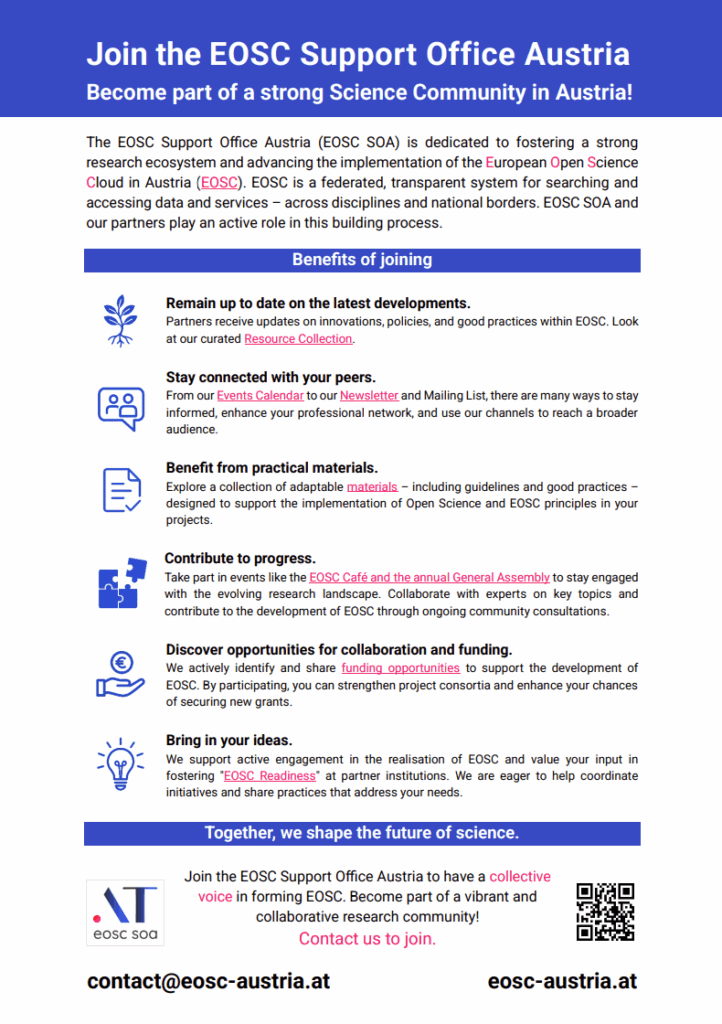Join
Colleagues at partner institutions across Austria are furthering the goals of Open Science and the EOSC in their work every day. Join your peers to have a collective voice in shaping EOSC and Open Science policies at the Austrian and European levels.
What’s in it for my institution?
Your institutional membership is important as it adds voice and support to maintaining exchanges via:
a listserv/mailing list,
an up-to-date calendar for relevant events in Austria and across Europe,
calls for funding and participation,
regular newsletters,
a Zenodo community,
online and in-person events,
and more.
In 2024, the SOA will roll out a site for downloadable resources featuring presentation slides and PDFs from webinars, workshops, and presentations on research data management, Open Science policy, data stewardship, FAIR and CARE principles, and the like, given by reputable organizations or institutions.
The site will also host original content produced by the SOA, such as one-pagers, checklists, infographics, charts, etc.
The “Austria Country Profile” provides a quarterly overview of the current Open Science landscape in Austria.
Individuals at partner organizations are encouraged to get involved in one of 5 working groups to advance the goals of EOSC.
Every year, the SOA organizes a General Assembly to bring partners and stakeholders together and discuss progress towards a federated open data network in Austria and Europe.
Educational, research, and cultural heritage institutions, initiatives, and projects, as well as private industry, are eligible to join the SOA and become “partners”.
Individuals interested in Open Science and EOSC may sign up for our newsletter or mailing list at any time.
Simply write to contact@eosc-austria.at. Someone from the SOA team will get back to you.
FAQs
- The conditions for joining are the same regardless of what kind of partner your organization becomes (e.g., membership is free; signing onto the Memorandum of Understanding).
- Ordinary partners are institutions that are also members or observers of the European-level EOSC Association.
- Extraordinary partners have joined the SOA but are not members of the EOSC Association.
- Both ordinary partners and extraordinary partners have voting rights at the annual SOA General Assembly.
- Ordinary partners that are members of the EOSC Association have 10 votes, and Observers of the EOSC Association have 5 votes.
- Extraordinary partners have 1 vote.
- Partner organizations retain ownership rights over their contributed goods and information unless otherwise agreed.
- Partner organizations grant each other and the SOA non-exclusive, non-transferable, royalty-free license usage rights to contributed goods and information for the purposes of the joint initiative.
- Both the mailing list and the newsletter are open for all to sign up for, regardless of membership in the SOA.
- The mailing list is a multi-way communication channel for the Open Science and EOSC communities in Austria to share information, events, and calls.
- To sign up for the mailing list, just write a short email to contact@eosc-austria.at.
- The Newsletter is curated by the Secretariat of the SOA and sends the announcements from the SOA directly to your inbox. It also often features a list of events, calls, and links of interest to the community. Contributions are welcome!
- Add the link to sign up for the newsletter.
- The SOA website and most of our content are produced in English as we recognize it as the lingua franca of research communities in Austria and at large. We aim to make the SOA as accessible as possible, as some researchers and research support staff are not fluent in German and prefer to communicate in English. That being said, as an organization that brings together the Open Science and EOSC community in Austria, we recognize the importance of especially legal documents being in German. In the future and as resources allow, we will make an effort to make our content bilingual.
- Within the structure of the European-level EOSC, there must be a “mandated organization” that formally represents Austria. At the time of the founding of the EOSC Austria initiative, the ACONET Association volunteered to be the legal entity that allowed the SOA to form. However, the SOA is, for all intents and purposes, the office of the mandated organization.
- The Vienna-based ACONET Association, founded in 1986, is the mandated organization for the EOSC Support Office Austria. The ACONET Association houses the ACOnet—the shared high-performance internet grid for local non-profit organizations in the realms of science, research, education, and culture.

